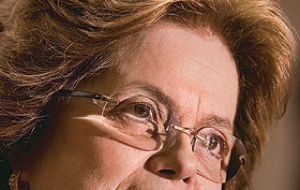MercoPress. South Atlantic News Agency
Brazil prepared to extend political asylum to Zelaya
 Dilmar Rousseff admits a new political situation has emerged in Honduras
Dilmar Rousseff admits a new political situation has emerged in Honduras The Brazilian government is considering extending political asylum to Honduran ousted president Manuel Zelaya who remains holed in at the Brazilian embassy in Tegucigalpa since last September according to reports in the Sunday press.
Brazil has yet to make an official announcement following the results of the elections held on Sunday November 29th and which have “created a new situation”.
According to the magazine Isto E, one of the options under consideration by the Brazilian government is to extend political asylum to Mr. Zelaya thus allowing him to abandon the embassy in Tegucigalpa.
Last week Foreign Affairs minister Celso Amorim said that since there’s no timetable for Zelaya to abandon the embassy, it is possible the ousted president might decide to leave.
Meanwhile President Lula da Silva stated last week that Brazil would not recognize the government born out of the November 29th elections, --won by conservative Porfirio Lobo--, or the current de facto leader Roberto Micheletti.
Nevertheless Brazilian diplomacy has been sending “flexibility” messages regarding the new political scenario.
Cabinet chief Dilma Rousseff stated “it can’t be ignored that Honduras suffered a coup but we can’t ignore the new scenario and that is that elections were held”.
From Washington the Organization of American States Secretary General Jose Miguel Insulza said that “to recognize or not another government as legitimate is prerogative of every sovereign government and each of our member states will freely decide on the matter”.
He added that the immediate creation of a national unity government in Honduras will “strongly” help reconciliation and avoid the new elected government from receiving power from a de facto regime.
United States, Colombia, Peru, Panama and Costa Rica have said they recognize the election results while the rest under the leadership of Brazil and Venezuela refuse such a position.
Meanwhile the Federation of Commerce Chambers from the Central American Isthmus, Fecamco, has called on the European Union to recognize the newly elected Honduran government and thus proceed with negotiations for an association agreement between the two regions.
Fecamco director Jorge Daboub said that all Central American Commerce chambers “unanimously support and acknowledge the results of the Honduran election”.




Top Comments
Disclaimer & comment rules-

Read all commentscorrect decision !
Dec 08th, 2009 - 04:07 am 0Commenting for this story is now closed.
If you have a Facebook account, become a fan and comment on our Facebook Page!